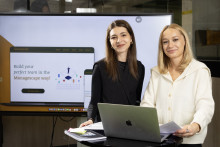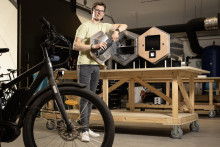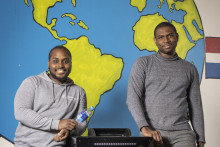They met during their bachelor’s in communication science. Amalia Bălan from Romania and Madalina Plosnita from Moldova. After their internships, their paths crossed again and it just so happened that they both had the exact same experience at their respective workplaces: they saw managers putting together a team or hiring new staff based on their feelings rather than science-based data.
Bălan: ‘And believe me, it’s a big problem. Because managers tend to hire people they can recognise themselves in: the similarity-attraction effect. Not only does this lead to great inequality, it can also result in your team missing certain hard and soft skills. We wanted to do something about that.’
Artificial intelligence
That ‘something’ led to the birth of Managescape in March 2022. Managescape is a tool that offers guidance in forming a team, specifically for managers of medium and large size companies. The data is based on the qualities of the employees already working at the company. Plosnita: ‘We provide employees with a neuroscientific questionnaire to identify their unique profile through artificial intelligence. This includes personality, mutual connection technical skills - such as programming or accounting - and soft skills such as creativity and critical thinking. This way, a manager knows exactly what skills and qualities they have within their workforce, but also what is still missing.’
‘A start-up is a continuous learning process' - Amalia Bălan
The duo built the tool themselves and it is now part of the Novel-T ADVANCED programme. In 2022, they received a 4TU wildcard and won the ASML Makers Award at the UT Challenge. Bălan: ‘A great surprise, especially since ASML is mainly focused on manufacturing and engineering. For us, it was a confirmation that the problem we want to tackle is prevalent everywhere.’
Patience
Bălan and Plosnita talk passionately about Managescape and firmly believe in the importance and potential impact of their start-up. At the same time, the duo is also aware that there are considerable steps to take before Managescape can enjoy a sustainable future. Plosnita: ‘We’re now in the testing phase to improve the tool and are in contact with potential customers. These are two companies with about fifty employees. We’re also working towards a testing phase with a company with over a hundred employees. The more input the tool receives, the better the results. That’s how artificial intelligence works. This phase is interesting, but it requires an incredible amount of patience. We’re constantly taking two steps forward and one step back.’
‘A start-up is a continuous learning process,’ Bălan adds. ‘Madalina and I believe in our mission one hundred percent, but in this phase, finding the right people for our start-up is difficult. Our resources are limited and you need to intrinsically motivate people with a long-term vision to get them on board. For now, we’re doing everything with just the two of us and we receive support from two colleagues from Novel-T in IT and communications.’
In the future, Managescape hopes to help all sorts of companies with team formation. For the coming period, the focus will be on the healthcare and education sectors. ‘The Dutch healthcare sector is supposed to be largely digitised by 2030, but institutions often have no idea whether and to what extent their employees are ready for this. We can help by mapping out the complete staff profile. What skills are missing in the workplace? A manager or HR can take this into account during recruitment. Then, choices can be made based on specific data,’ explains Bălan.
'I hope people understand how big our impact can be' - Amalia Bălan
She also sees potential for Managescape in the world of education, for instance to tackle the high drop-out rate in the first year. ‘In project-based education, not everyone gets the chance to excel. Suppose someone doesn’t feel welcome, is introverted or feels lonely. Then they might drop out, even though they might be of added value elsewhere. We see opportunities here, through mapping skills while also taking personality and mutual connection into account,’ says Bălan.
Filter bubble
According to her, the biggest problem Managescape wants to tackle is the initial filter bubble used by managers. ‘They choose people they feel good about. That is often a narrow selection, but it has major consequences. A lot of talent is left out and as a company you lose that talent.’ Plosnita: ‘And subjectivity has another big disadvantage. Managers can make choices in an application process that not everyone supports. Our report provides transparency in the recruitment process and in the internal decision-making process.’
The alumni - who work in the Incubase spaces at the Bastille - put a lot of time into building trusting relationships with potential clients and getting to know the company culture. When is their job finished? ‘That depends on the client, but in the ideal scenario, we deliver a report with data and companies stay connected to us, as neuroscientific research is not a one-off thing,’ says Bălan.
The entrepreneurial duo has no shortage of ambition. Bălan hopes that Managescape will eventually become the European leader in data-based organisational development. ‘And I hope people understand how big our impact can be. We all spend so much time with colleagues, often more than we do with family. By putting together a complementary team, managers can be lifesavers. Not feeling happy at work is a terrible thing, also for those around you. We can make a difference there and we want to convey that message.’






